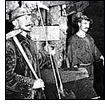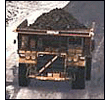|
Listen
|
Listen to the archived broadcast in RealAudio:
Hour One
Hour Two
|
|
|
|
About Mainstreet
|
Mainstreet Radio started in 1987 with the mission of reporting from rural Minnesota to all of Minnesota. Each month, Mainstreet Radio presents a two-hour special focusing on rural issues.
Go to Mainstreet Radio
|
|

|
|
|
| The History of Mining |
Listen to Part
One |
|
 By 1865, when gold fever was sweeping the country, gold was
discovered on Lake Vermillion's Pike Bay. The news made newspapers
across the country and 2,000 anxious gold miners converged in
northeastern Minnesota. The excitement was short lived but did lead
to discovery of pure iron ore deposits in the area.
By 1865, when gold fever was sweeping the country, gold was
discovered on Lake Vermillion's Pike Bay. The news made newspapers
across the country and 2,000 anxious gold miners converged in
northeastern Minnesota. The excitement was short lived but did lead
to discovery of pure iron ore deposits in the area.
In l892 the first iron ore mine was operating in the area. Twenty
years later, lll mines were operating on the Mesabi Iron Range and
90,000 people lived in mining towns across the region. Dominated by
Finns, Croatians and Slovenian-Austrians, there were also Swedes,
Norwegians, Serbs, Italians, Belgians, Chinese and Arab workers
among others. Most planned to be in the country only long enough to
strike it rich before returning home but ended up staying on the
Iron Range. The great Mesabi Iron Range was known worldwide for its
rich iron ore deposits and attracted international skilled and
unskilled labor.
Guests:
Marvin Lamppa,
college history professor and Iron Range historian.
Ed Nelson,
archivist at the Iron Range Research Center
|
|
| The Future of Mining |
Listen to Part
Two |
|
 For 100 years, Minnesota's mineral deposits have fueled one of the
state's dominant industries. Despite its roller-coaster history,
industry officials say future prospects remain bright based on
available natural resources. At current rates, iron mining
operations could continue for over 200 years before running out of
ore, according to industry officials. However, Minnesota mining
operations face major challenges. Rising production costs, increased
foreign competition and declining markets for taconite pellets are
causes for concern.
For 100 years, Minnesota's mineral deposits have fueled one of the
state's dominant industries. Despite its roller-coaster history,
industry officials say future prospects remain bright based on
available natural resources. At current rates, iron mining
operations could continue for over 200 years before running out of
ore, according to industry officials. However, Minnesota mining
operations face major challenges. Rising production costs, increased
foreign competition and declining markets for taconite pellets are
causes for concern.
Meanwhile, interest is growing in Minnesota's non-ferrous
minerals including copper-nickel, platinum, palladium and rhodium.
At least four companies are currently exploring mineral deposits
others are actively pursuing mineral leases. Our panel will discuss
future prospects for iron ore mining as well as non-ferrous
minerals.
Guests:
John Swift,
commissioner of the Iron Range Resources and Rehabilitation
Board
Ann Glumac, president of the Iron Mining
Association
Ernest Lehmann, president, Minnesota
Exploration Association
Donald Gentry,
president, PolyMet Mining Corp.
|
|

Made possible by a grant from the Blandin Foundation
|
|

|
|